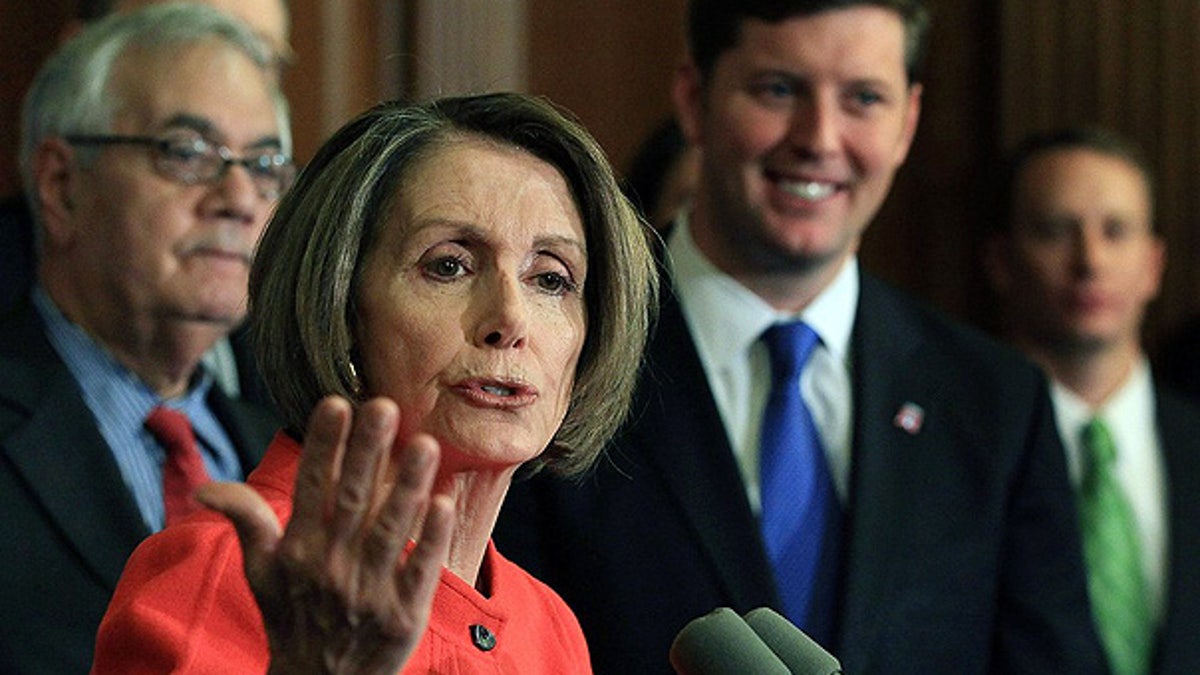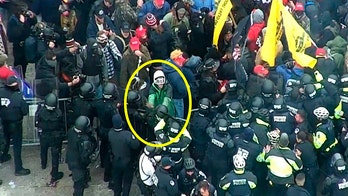
Dec. 15: House Speaker Nancy Pelosi is flanked by Rep. Barney Frank, left, and Rep. Patrick Murphy during a news conference on Capitol Hill. (AFP)
House Democratic leaders on Thursday quelled an uprising among liberals over procedural issues with the massive tax cut package that was negotiated by the White House and Republicans.
Democratic leaders emerged from an evening caucus meeting Thursday, saying they were on track for a vote by the end of the night and started debate on the package later in the night.
The package had screeched to a halt after liberals pushed for two separate votes -- one on an alternative proposal that would raise the estate tax above what Republicans want and another on the entire package, which sailed through the Senate on Wednesday.
Rep. Louise Slaughter, D-N.Y., chairwoman of the Rules Committee said "just about everybody" initially had a problem with the terms of debate. The primary complaint was that if they passed the alternative bill, they would not be able to cast a vote on the Senate version -- and they wanted to be able to vote on both packages no matter what.
The House went into recess but later returned, with Democratic leaders vowing to finish debate on the bill in a matter of hours.
In addition, Rep. Peter DeFazio, D-Ore., said Democrats are pushing for more changes to the bill, including an extension of the income tax credit from the 2009 stimulus law.
The dispute appears to have slowed the bill's momentum after the Senate overwhelmingly passed the $858 billion package of tax breaks and unemployment aid on Wednesday.
After the Senate vote Wednesday, President Obama declared himself still opposed to portions of the legislation because it keeps in place big tax benefits for the wealthy. Nevertheless, he said, compromise was necessary.
"I know that not every member of Congress likes every piece of this bill, and it includes some provisions that I oppose. But as a whole, this package will grow our economy, create jobs, and help middle class families across the country," Obama said in a statement.
In return for keeping in place tax cuts for all income levels, Obama had won a Republican pledge to vote for a 13-month extension of jobless benefits for the long-term unemployed. The deal also includes a 2 percent reduction in payroll taxes that fund Social Security, the federal pension system for the retired and disabled.
Most Democrats, along with Obama, opposed keeping tax cuts in place for households earning more than $250,000 a year. But Republicans threatened to scuttle a continuation of tax breaks for those who earn less than that amount without continued breaks for the wealthy.
The part of the Senate-passed legislation liberal House Democrats find most upsetting involves the inheritance taxes. Under the compromise negotiated between Obama and congressional Republicans, the portion of estates above $5 million would be subject to a 35 percent tax rate.
House Democrats want the taxation threshold lowered to $3.5 million, and the top rate increased to 45 percent. That's the alternative plan they were expected to vote on Thursday.
If the House passes that plan, the bill would have to return to the Senate -- both chambers must pass identical versions of the package. However, if the House rejects the alternative plan and subsequently approves the Senate-passed plan instead, then the package goes straight to Obama's desk for his signature.
Despite House Democrats' displeasure with the law, it was widely expected to pass because few lawmakers in either party are keen to have cast a vote that could significantly raise taxes on the middle class. That's presuming the House can get past the "rules" phase.
Thirty-one members of the conservative Blue Dog Democrats sent a letter to House Speaker Nancy Pelosi urging quick passage of the bill.
"It is time for us to put aside the partisan talking points and accomplish what the American people sent us here to do," said the letter.
Fox News' Chad Pergram contributed to this report.




